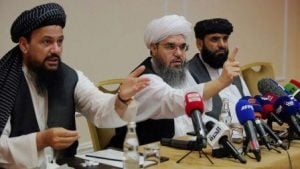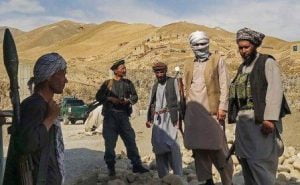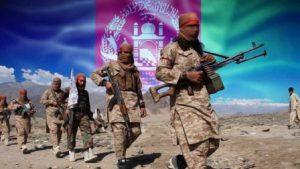

AS a resurgent Taliban continue their military advance in Afghanistan fears are growing in the region and beyond about what lies ahead for the war-torn country.
A throwback to the past with armed power struggles between militias? A protracted civil war? An ascendant Taliban flushed with victory eventually setting up a Taliban government with nominal inclusion of minorities? Or will the Taliban reach out to other Afghan parties for negotiations to forge agreement on their country’s political arrangements and future?
The American military withdrawal is nearing completion in what President Joe Biden described in his end-of-mission address as a speedier drawdown driven by safety concerns. It has been orderly and so far, casualty-free.
This means that the US-Taliban Doha agreement is holding with the Taliban ensuring a peaceful exit. Pakistan has also played a supportive role in facilitating a smooth US pullout through GLOCS (ground lines of communication) and ALOCS (air lines of communication).
But as the US drawdown entered its final phase, with 90 per cent now completed, fighting escalated between Afghan government forces and the Taliban.
The Taliban have stepped up their offensive and in a series of military assaults overrun and captured many districts. Their apparent strategy to secure control of highways and encircle cities has seen a growing meltdown of government forces with surrenders by demoralised soldiers across northern Afghanistan that has reinforced their military momentum.
 Taliban spokesmen claim most districts have been taken by negotiation and without a fight. Having seized areas on the border with China, Iran, Turkmenistan and Tajikistan the Taliban now control the border there with the Afghan government consequently losing their grip over significant parts. Taliban representatives have however sought to reassure anxious neighbours that they pose no threat to the region.
Taliban spokesmen claim most districts have been taken by negotiation and without a fight. Having seized areas on the border with China, Iran, Turkmenistan and Tajikistan the Taliban now control the border there with the Afghan government consequently losing their grip over significant parts. Taliban representatives have however sought to reassure anxious neighbours that they pose no threat to the region.
Diplomatic efforts aimed at intra-Afghan negotiations that had stalled in Doha have been overtaken by fast-moving developments on the ground. Attention has turned to when the Taliban will likely mount an assault on Kabul and whether the ANSF would be able to hold them off for any length of time.
Assessments vary about the fall of the Afghan government. Although President Biden has said a Taliban takeover is not inevitable, a much-cited US intelligence assessment concluded it could be as early as six months. Reduced US air support for Afghan forces may contribute to this. Pakistan’s assessment is that Kabul could hold out beyond six months.
The Taliban themselves have maintained a meaningful silence on this. Instead, they have announced they plan to accelerate the peace process in the coming month and present a written peace proposal.
Their spokesman declared last week that “Although we have the upper hand on the battlefield we are very serious about talks and dialogue”. At a recently convened meeting in Moscow a Taliban leader also reiterated the desire for a peaceful settlement.
 The US, for its part, has warned the Taliban against any military takeover and continued to call for a negotiated settlement.
The US, for its part, has warned the Taliban against any military takeover and continued to call for a negotiated settlement.
A State Department spokesman said earlier this month that “The world will not accept the imposition by force of a government in Afghanistan. Legitimacy and assistance for any Afghan government can only be possible if that government has a basic respect for human rights”.
Meanwhile, in response to a question, President Biden stated bluntly that the US would not be responsible if the Taliban took over militarily or if civil war broke out.
The key question now is whether the international community can still act to encourage the Taliban and other parties to pursue a negotiated settlement. While Biden said it was time for “determined diplomacy” for peace he did not spell out what this meant other than reiterate that it was up to Afghans to decide their own destiny.
Though time is running out there is still a narrow, but fast-closing window for collective action. The most immediate need is for regional states and big powers to desist from arming the warring Afghan sides and to strictly implement a policy of non-interference in this regard.
A joint declaration to this effect should be considered. Anything less will fuel a civil war worse than that witnessed in the 1990s which will only compound the suffering of the Afghan people who yearn for peace and order.
Beyond this, the extended Troika — US, China, Russia and Pakistan — plus Iran (who will need some persuasion) should consider mounting collective pressure on the Afghan parties to encourage them to work for an orderly transition to an interim government.

Some would argue it is too late for this. But there is time for a last-ditch effort to avoid a chaotic outcome. Far better than simply watching the situation unravel or issuing platitudinous statements. No country has enough leverage individually but collectively deployed leverage might influence the parties to be responsive.
The Troika plus Pakistan and Iran could offer a package of incentives to help spur intra-Afghan talks towards a settlement. This can include three elements. One, an assurance to lend legitimacy to such an outcome especially as the Taliban would want to reinforce, not lose, the international recognition they won with the Doha agreement.
Two, an offer to begin the process of delisting of individuals and entities from the UN’s sanctions regime; this was promised to the Taliban by the Doha accord in return for entering intra-Afghan talks.
And three, the assurance of international economic assistance which the next government in Kabul will need to rebuild a war-ravaged country. Holding out the promise of a peace dividend should also aim to mobilise public pressure on the Afghan parties not to squander an opportunity for peace and stability.
Pakistan should encourage an early meeting of representatives of the extended Troika countries even if it is convened virtually to issue a no-arms supply and non-interference declaration as well as agree on a package of incentives to place before the Afghan parties.
Let it not be said that diplomacy failed the people of Afghanistan who have already suffered so much through decades of war, turmoil and strife. And let history not judge that Afghanistan and the region all lost the peace. ![]()
This article first appeared in Dawn.
______________________________
Also Read:
Why has Rafale revisited suddenly?
Urdu poetry and the transitional era
यह भी पढ़िये: मेहरबान जज साहिब
Watch video:

Disclaimer : PunjabTodayTV.com and other platforms of the Punjab Today group strive to include views and opinions from across the entire spectrum, but by no means do we agree with everything we publish. Our efforts and editorial choices consistently underscore our authors’ right to the freedom of speech. However, it should be clear to all readers that individual authors are responsible for the information, ideas or opinions in their articles, and very often, these do not reflect the views of PunjabTodayTV.com or other platforms of the group. Punjab Today does not assume any responsibility or liability for the views of authors whose work appears here.
Punjab Today believes in serious, engaging, narrative journalism at a time when mainstream media houses seem to have given up on long-form writing and news television has blurred or altogether erased the lines between news and slapstick entertainment. We at Punjab Today believe that readers such as yourself appreciate cerebral journalism, and would like you to hold us against the best international industry standards. Brickbats are welcome even more than bouquets, though an occasional pat on the back is always encouraging. Good journalism can be a lifeline in these uncertain times worldwide. You can support us in myriad ways. To begin with, by spreading word about us and forwarding this reportage. Stay engaged.
— Team PT


Copyright © Punjab Today TV : All right Reserve 2016 - 2024 |